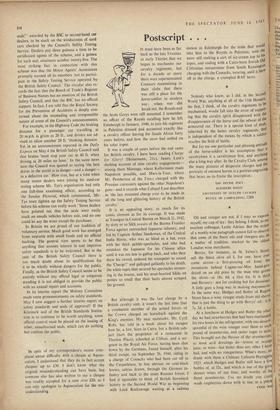Postscript . .
It was a couple of years before the end came for British cavalry. I have been reading Charge for Glory! (Heinemann, 21s.), James Lunt's dashing account of nine cavalry engagements— among them Marengo, where Kellermann made Napoleon possible, and Mars-la-Tour, where Mr. Pemberton of the Times charged with the Prussian cuirassiers against the other Napoleon's guns—and it records what Colopel Lunt describes as 'the last mounted charge ever to be made in all the long and glittering history of the British cavalry.'
It is an appealing story, as much for its comic element as for its courage. It was made at Toungoo in Central Burma on March 21, 1942, by sixty or so Sikh so►vars of the Burma Frontier Force against entrenched Japanese infantry, and led by Captain Arthur Sandeman, of the Central India Horse, who was as blind as a bat, even with his thick pebble-spectacles, and who had mistaken the Japanese for his Chinese allies until it was too late to gallop back, and who then drew his sword, ordered his trumpeter to sound the 'Charge!' and galloped gallantly to his death, the white tapes that secured his spectacles stream- ing in the breeze, and his stout-hearted Sikhs on ponies so small that their heels almost scraped the ground.
*
But although it was the last charge by a British cavalry unit, it wasn't the last time that a combatant member of the armed forces of the Crown charged on horseback against the King's enemies. My near namesake, Mr. Cyril Rae, has told in a book about his escapes how he, a Jew, born in Cairo, but a British sub- ject (now the proprietor of a restaurant in Thurloe Place), schooled at Clifton, and a ser- geant in the Royal Air Force, having been shot down by the Germans, found himself, after his third escape, on September 26, 1944, riding in a charge• of Cossacks who had been cut off in the Carpathians, in line abreast on coal-black horses, sabres drawn, through the German in- fantry and back to the main Russian forces. I find it agreeable to think of British horseback history in the Second World War as beginning with Lord Rocksavage waiting at a railway station in Edinburgh for the train that would take him to the Royals in Palestine, with the snow still making a sort of ice-cream top to his topee, and ending with a Cairo-born Jewish Old Cliftonian restaurateur from South Kensington charging with the Cossacks, wearing, until it blew off in the charge, a crumpled RAF beret.
Nobody who knew, as I did, in the Second World War, anything at all of the 11th Hussars, the first, I think, of the cavalry regiments to be mechanised, would fall into the error of suppos• ing that the cavalry spirit disappeared with the disappearance of the horse and the advent of the armoured car. There is a special kind of dash, inherited by the better cavalry regiments, that is independent of the means by which a soldier reaches the field of battle.
But for me one particular and pleasing attitude of the horse-soldier is his assumption that a cavalryman is a cavalryman first, and anything else a long way after. In the Cavalry Club, among the many pictures of desperate charges and the portraits of eminent horses is a portrait-engraving that bears on its frame the inscription:
THE DIVINE POET ALIGHIERI DANTE LIEUTENANT OF GUELPH CAVALRY BATTLE OF CAMPALDIN0,1289
Oil and vinegar are not, if I may so express myself, my cup of tea : they belong, I think, to mY esurient colleague, Leslie Adrian. But the writer of a weekly wine paragraph cannot fail to observe that some of the finest oils and Vinegars are, as a matter of tradition, stocked by the oldest London wine merchants.
Berrys, for instance, in St. James's Street, sell the finest olive oil 1, for one, have ever come across—a first-pressing oil from the mountains behind Cagnes-sur-Mer, hand-pro- duced on an old press by the man who grows the olives—at 18s. 6d. a litre tin. It is thick and flavoury : not for cooking but for dressings• A little goes a long way in making mayonnaise• In the same way, Hedges and Butler of Regent Street have a wine vinegar made from old sherry that is just the thing to go with Berrys' oil : it Is 7s. 3d. a bottle.
At a luncheon at Hedges and Butler the other day we had strawberries that had been marinaded for two hours in the refrigerator, with one dessert' spoonful of the wine vinegar over them to each pound of strawberries, and caster sugar to taste. This brought out the flavour of the strawberries. as most acid dressings do—lemon or mange juice, or wine—but better than any other I have had, and with no vinegariness. What's more, We drank with 'them a Château Lafaurie-Peyragnev 1923, which Hedges and Butler still have a few bottles of, at 32s., and which is One of the great dessert wines of our time, and worthy of the finest strawberries. I've no doubt you could wash raspberries down with it, too, at a pinch•










































 Previous page
Previous page